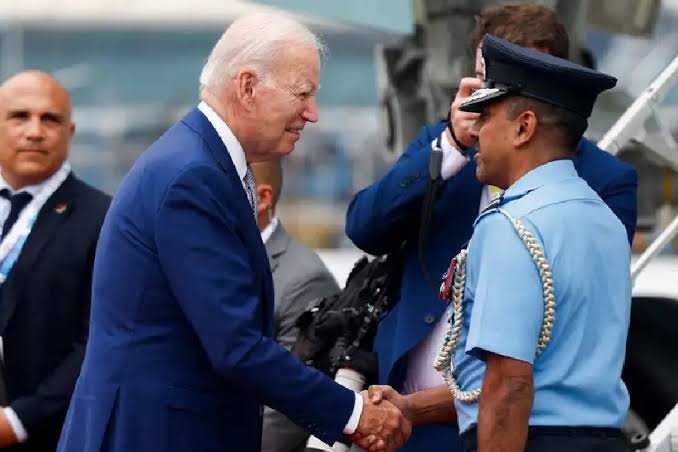US, Vietnam strengthen ties amid growing concerns over China

In a bid to fortify their diplomatic relationship amidst escalating regional concerns over China’s expanding influence, U.S. President Joe Biden landed in Vietnam today following his participation in the G20 summit in New Delhi.
His visit, which includes meetings with Vietnamese leaders, is expected to culminate in the signing of a “comprehensive strategic partnership,” the highest level of diplomatic ties between the two nations.
President Biden’s visit underscores the shared interests of the United States and Vietnam in maintaining regional stability and security, particularly in the hotly contested South China Sea.
However, just ahead of the visit, a report in The New York Times revealed that Vietnam had been secretly arranging to purchase arms from Russia, potentially undermining U.S. sanctions. The Vietnamese government has yet to issue a statement regarding these allegations.
The strengthening of diplomatic ties between the United States and Vietnam holds significant importance for the Southeast Asian nation, which currently maintains top-level relationships with only a handful of countries, including Russia, India, South Korea, and China. While Vietnam maintains a stance of non-alignment between the U.S. and China, it shares growing concerns about its neighbor’s assertiveness in the South China Sea.
Beyond diplomatic relations, the United States and Vietnam have been building increasingly close trade ties. Washington views Hanoi as a critical partner in diversifying its supply chains away from China, particularly following disruptions in global supply chains in recent years.
President Biden’s itinerary includes a welcome ceremony, speeches by both leaders, and a press conference in Hanoi. He will also meet with President Vo Van Thuong and Prime Minister Pham Minh Chinh during his visit.
While strengthening strategic interests, President Biden is also expected to address human rights concerns during his visit to Vietnam. The country has faced criticism for its poor human rights record, including the intimidation and imprisonment of government critics, unfair trials, and allegations of police torture. National Security Advisor Jake Sullivan has indicated that President Biden will raise issues related to freedom of expression, religion, and other basic human rights.
Vietnam’s record on religious freedom was recently criticized by a U.S. government commission, which cited “egregious, ongoing, and systematic violations.” Prior to President Biden’s visit, a political prisoner, Nguyen Bac Truyen, was released and allowed to travel to Germany with his wife—a common practice by Vietnam before U.S. presidential visits.
President Biden’s visit to Vietnam follows the G20 summit, where leaders reached a joint declaration that avoided direct criticism of Moscow and did not include concrete pledges to phase out fossil fuels.
During his visit to Vietnam, President Biden will also pay tribute to his friend, the late Senator John McCain, at a memorial honoring McCain’s contributions to rebuilding ties between the United States and Vietnam during his years in captivity as a prisoner of war.







